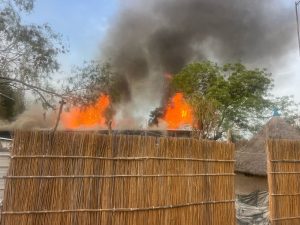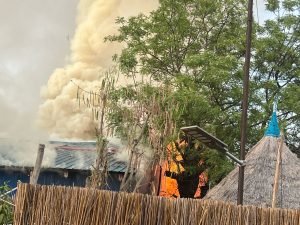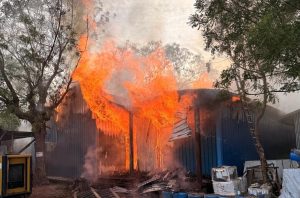Jonglei State, South Sudan (May 3, 2025) – Médecins Sans Frontières (MSF) strongly condemns the deliberate bombing of its hospital in Old Fangak, South Sudan. The attack began at around 4:30am when two helicopter gunships first dropped a bomb on the MSF pharmacy, burning it to the ground, then went on to fire on the town of Old Fangak for around 30 minutes. At around 7am, a drone bombed the Old Fangak market. There have been at least seven deaths and 20 injured.
Mamman Mustapha, MSF Head of Mission in South Sudan, said “At 8am, we received around 20 wounded people at our hospital in Old Fangak, including four in a critical condition. There are reports of more fatalities and wounded in the community. One patient and two care givers, including one of our staff, who were already inside the hospital were injured in the bombing – patients who were not in a critical condition, ran from the facility. The bombing of our hospital in Old Fangak has resulted in significant damage, including the complete destruction of the pharmacy, which was burned to the ground. This is where all our medical supplies for the hospital and our outreach activities were stored, severely compromising our ability to provide care. We strongly condemn this attack, which took place despite the geolocations of all MSF structures, including Old Fangak Hospital, being shared with all parties to the conflict.”
This is the second time an MSF hospital has been impacted since in the past month, following the armed looting of our hospital and premises in Ulang, Upper Nile state on April 14, which led to the entire population of Ulang county being cut off from accessing secondary health care.
Since 2014, MSF has been providing secondary healthcare services in Fangak County, a remote area where people struggle to access medical care due to flooding, insecurity, and displacement. The hospital supported by MSF is the only facility serving a population of over 110,000 people in Fangak county. Many patients travel for days by canoe to reach it, particularly during the rainy season when extreme flooding isolates entire communities.
In South Sudan, MSF works in six of the country’s 10 states and in two administrative areas, providing a range of services including general healthcare, mental healthcare and specialist hospital care. Our mobile teams also provide health assistance to displaced people and remote communities. In addition to responding to emergencies and disease outbreaks, we also carry out preventative activities, such as vaccination campaigns, seasonal malaria chemoprevention, safe drinking water and distribution of non-food items.















